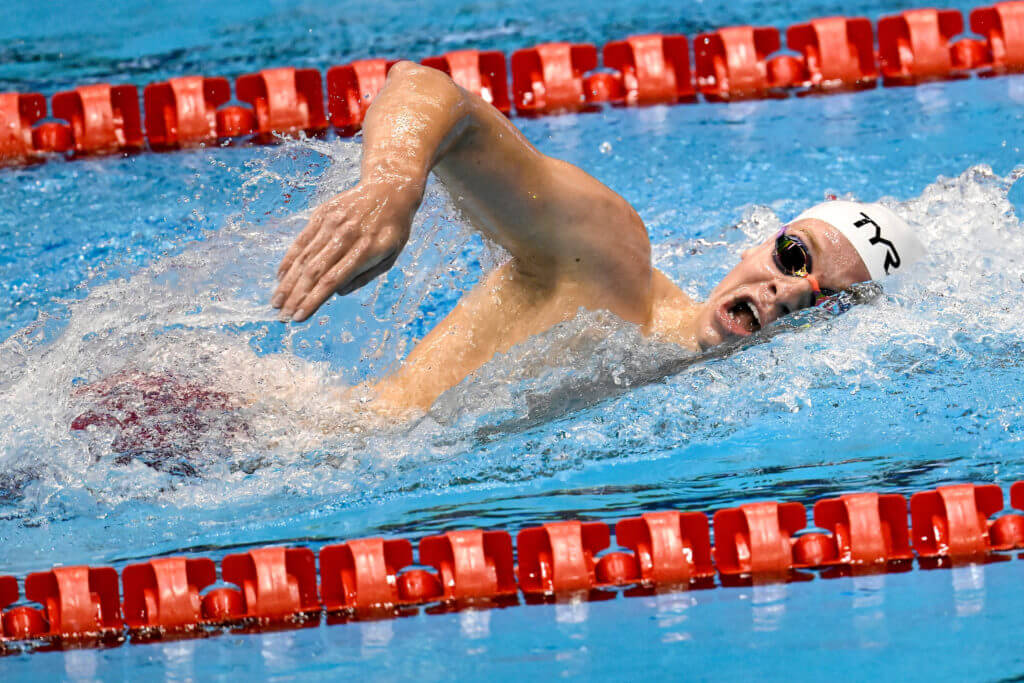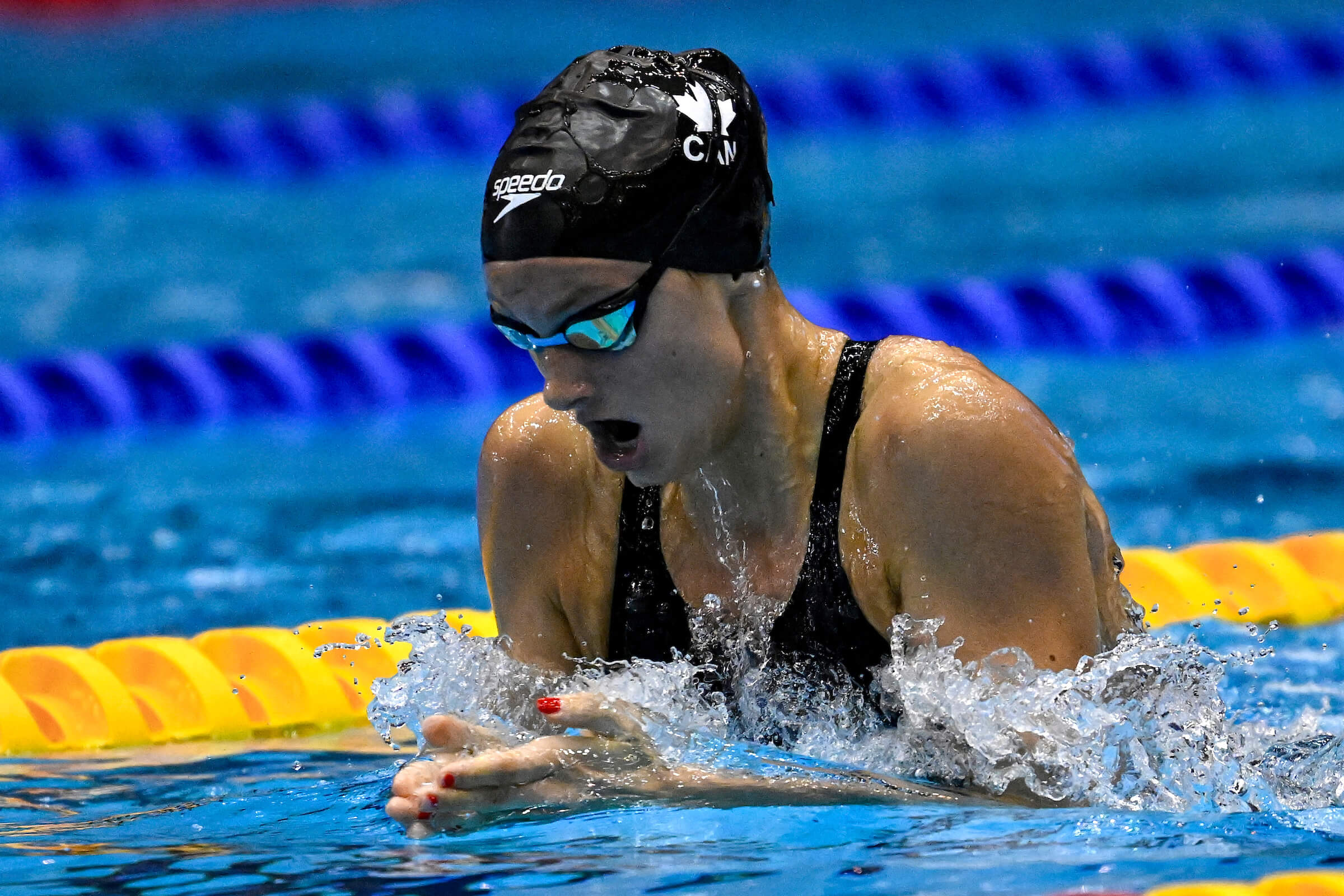Multi-Race Showcase for Swimming? A Proposal for an Aquatic Heptathlon

Multi-Race Showcase for Swimming? A Proposal for an Aquatic Heptathlon
One aquatic race long ago earned the title of “decathlon of swimming.” The 400 individual medley is one of the sport’s great tests of fitness and endurance, and it requires mastery of all four competitive disciplines. The top 400 IMer in the world can stake a claim to being the world’s best swimmer or certainly the most versatile. This was the race where Michael Phelps could show off all of his skills in one, and that’s why he went undefeated in the 400 IM for so long and held the world record for 21 years, longer than any other swimmer in history. Now, special talents like Leon Marchand and Summer McIntosh have perfected the skills necessary to become world-record holders in the grueling event.
But what if swimming had a multi-race test that could determine indisputably the world’s top swimmer? The recent World Athletics Championships was a reminder that swimming lacks an event akin to the men’s decathlon or women’s heptathlon in track and field. That sport which requires additional specialization compared to swimming, with few overlaps between sprints and mid-distance or mid-distance and distance on the track and almost no overlap in field competition.
The decathlon and heptathlon are comprised of athletes who don’t compete in single-discipline events, which makes sense considering the insane toll of contesting 10 (men) or seven (women) events over two days. The majority would not be competitive globally in any one of their events, which is a strong contrast from swimmers like Phelps, Marchand and McIntosh, all world champions in single-stroke events in addition to their medley success.
So imagine that swimming did have a combined event. Deploy a lineup of races, with certain times in each set to count for particular point values. Add up all the points to determine the standings. Simply adding times together for a composite would provide an advantage for endurance specialists since their races would take up a larger percentage of the entire competition. Under this points system, a high-quality 50 free provides the same impact as a stellar 400-meter race.
In athletics, the women’s heptathlon comprises of the 100 meter hurdles, high jump, shot put and 200 meters on day one, followed by the long jump, javelin throw and 800 meters on day two. Meanwhile, the men start out with the 100 meters, long jump, shot put, high jump and 400 meters and return the next morning for the 110 meter hurdles, discus throw, pole vault, javelin throw and 1500 meters.
For swimming, in which athletes generally can recover more quickly and compete more often than track athletes, we are proposing a single-day combined event split between two sessions with at least six hours off in between. The lineup w9uld be comprised of all existing events, and it could look like…
- Morning session: 50 Freestyle, 100 Backstroke, 100 Butterfly, 400 Freestyle
- Evening session: 200 Individual Medley, 100 Breaststroke, 200 Freestyle

Would Summer McIntosh excel in this swimming hepthatlon? — Photo Courtesy: Photo Courtesy: Andrea Staccioli / Deepbluemedia / Insidefoto
With that lineup, meet organizers could set up enough time for rest but not full recovery between events, allowing swimmers to do some cool-down, and all major skills are measured. These seven events measure all the major energy systems and ensure that no stroke (aside from freestyle) is prioritized over the others. The decathlon’s longest distance is 1500 meters, which takes less than five minutes, so it would not make sense to add anything longer to the program. As if swimmers would not be sufficiently fatigued after swimming seven races in one day!
Most importantly, these seven races in a short time frame would be sufficient to determine a champion, the title of best all-around swimmer in the world. Given their versatility, perhaps someone like Marchand or McIntosh would have the skills to win gold in this combined event, but maybe a completely different type of swimmer would excel here given the opportunity.
Octathlon?
Want to add another race to the mix, perhaps making the combined event a two-day affair? Insert the 100 free to attain a lineup that matches the American high school swimming program (with all short course yards events, including the 500 free). The 100 would fill a gap and provide an additional chance for speed-based athletes, but we felt comfortable with its exclusion from the program because of the presence of the 50 and 200 free plus so many other-stroke sprint events.
The 400 IM was also considered for inclusion, but adding that event is cruel during a grueling multi-event challenge. That said, a short course version of the combined event might benefit from having two medley races, the 100 and 400-meter swims, to test out enough different skillsets.
The Diving Question
If this is about finding the premier all-around aquatic athlete, do we need to include diving in our combined event? Maybe. When considering the various disciplines sponsored by World Aquatics, open water swimming was ruled out because of the plan to keep all races under 5:00, and water polo would be impossible to implement as a team sport. Artistic swimming would be possible, but diving would make the most sense for an addition here, testing out a very specific skill set that would differ wildly from any of the races.
Remember, the land decathlon goes from running sprints to jumps to throws and back again, so by that logic, of course diving should be part of our new combined event? Sure, there is almost no crossover between swim racing and diving, but that’s the point. Adding in, say, the 3-meter springboard would ensure the separation of the combined event from the rest of the swimming program.
Besides, many track and field experts would argue that pole vaulting represents a similarly disparate skill set to the other decathlon events, and it is still included. Diving thus follows the same logic. Like the aforementioned eight-race event, this new diving-inclusive octathlon would also need to be split over two full days.
But in a decathlon, all events are measurement-based events: how fast did you run, how high or long did you jump or how far did you throw. Same story in swimming (time), but diving is judged. Even with the best judges in the world, the sport cannot be fully objective, unlike the impartial nature of the clock. With that in mind, lumping in diving with a series of swimming races for our combined event would be a tough sell.




That is an awesome concept! Having been a competitive swimmer AND diver, putting a diving event in the mix would make for a definitive aquatic combination, like the decathlon in track.
Hahaaaa! Would love to see our elite swimmers on the 3m springboard!
In U.K. masters we have a decathlon of sorts OVER A CALENDAR YEAR. Your fastest time from any distance in 6 categories ( free/ distance free/ IM/ br/ fly/ back) and your next best time from 4 of those same categories are converted to points and added up.
It’s all done automatically from competition data. You dont need to ‘enter’.
You could make it (1) Pool swimming (2) Indoor diving (3) Cliff Diving (4) Open water Swimming (5) some Water Polo exercise (6) Artistic Swimming (7) Long Plunge (UK historic event)